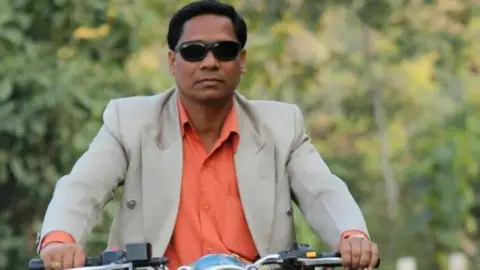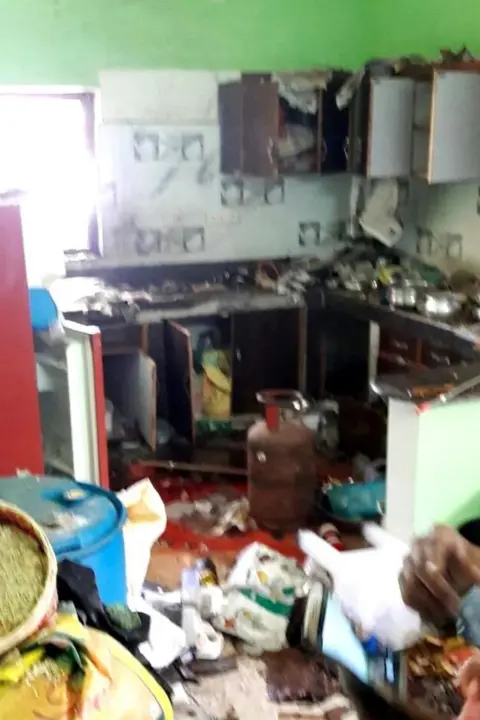'Wedding bomb' murderer gets life sentence in India
 BBC
BBCA former college principal in the eastern Indian state of Odisha has been sentenced to life in prison for sending a parcel bomb that killed a newlywed man and his great aunt in 2018.
A court found Punjilal Meher, 56, guilty of murder, attempted murder, and use of explosives in what became known as the "wedding bomb" case that stunned India.
The bomb, disguised as a wedding gift, was delivered to the home of Soumya Sekhar Sahu, a 26-year-old software engineer, just days after his wedding.
When the couple opened the package, it exploded - killing Sahu and his great aunt, and leaving his wife, Reema, who opened the package, critically wounded.
 Facebook/Punji Lal Meher
Facebook/Punji Lal MeherWhile acknowledging the prosecution's argument that it was a "heinous" crime, the court declined to classify it as a "rarest of the rare" case deserving the death penalty.
The BBC covered the incident in a detailed two-part investigative series.
- Who sent the wedding gift bomb that killed this newlywed?
- A wedding bomb, a letter and an unlikely suspect
The February 2018 explosion took place in Patnagarh, a quiet town in Odisha's Bolangir district.
The victims had been married just five days and were preparing lunch when a parcel arrived at their home. It was addressed to Soumya and appeared to be a wedding gift, allegedly sent from Raipur in Chattisgarh state, over 230km (142 miles) away.
As Soumya pulled a thread on the parcel to open it, a powerful blast tore through the kitchen, killing him and his 85-year-old great-aunt Jemamani Sahu. Reema, then 22, survived with serious burns, a punctured eardrum, and trauma.
After a prolonged investigation, police arrested Meher, then 49, a teacher and former principal of a local college where Soumya's mother worked.
Investigators had told me then that Meher harboured a grudge over professional rivalry and meticulously planned the attack. He used a false name and address to mail the bomb from Raipur, choosing a courier service without CCTV or parcel scanning.
The bomb travelled over 650km by bus, passing through multiple hands before being delivered. Investigators said it was a crude but deadly device wrapped in jute thread, rigged to detonate on opening.
The parcel carrying the explosive bore a fake name - SK Sharma from Raipur. Weeks passed with no clear suspects. Investigators scoured thousands of phone records and interrogated over 100 people, including one man who had made a threatening call after Reema's engagement - but nothing stuck.
Then, in April, an anonymous letter reached the local police chief.
It claimed the bomb had been sent under the name "SK Sinha," not Sharma, and cryptically mentioned motives of "betrayal" and money.
The letter claimed three men had "undertaken the project" and were now "beyond police reach". It cited the groom's "betrayal" and money - hinting at a scorned lover or property dispute - as motives. It also asked police to stop harassing innocents.
The letter turned the investigation.
Arun Bothra, a police officer who then headed Odisha's crime branch, noticed that the handwriting on the parcel's receipt had been misread: it did resemble "Sinha" more than "Sharma."
Crucially, the letter writer seemed to know this - something only the sender could have known.
The police now believed the suspect had sent the letter himself.
"It was clear that the sender knew more about the crime than we did. By writing that it was being sent by a messenger, he wanted to tell us that the crime was not the work of a local man. He wanted to tell us that the plot was executed by three people. He wanted to be taken seriously, so he was kind of blowing his fake cover by pointing out a mistake we had made," Mr Bothra told me in 2018.

The victim's mother, a college teacher, recognised the letter's writing style and phraseology as that of a colleague, Meher, a former principal she had replaced.
Police had previously dismissed Meher's workplace rivalry as routine academic politics. Now he became the prime suspect.
Under questioning, Meher initially offered an implausible story about being forced to deliver the letter under threat.
Police allege he later confessed: he had hoarded firecrackers during Diwali, extracted gunpowder, built the bomb, and mailed it from Raipur using a courier.
He allegedly left his phone at home to create an alibi and avoided CCTV by not buying a train ticket. Meher had even attended both the victim's wedding and funeral.
Additional reporting by Sandeep Sahu in Bhubaneshwar
